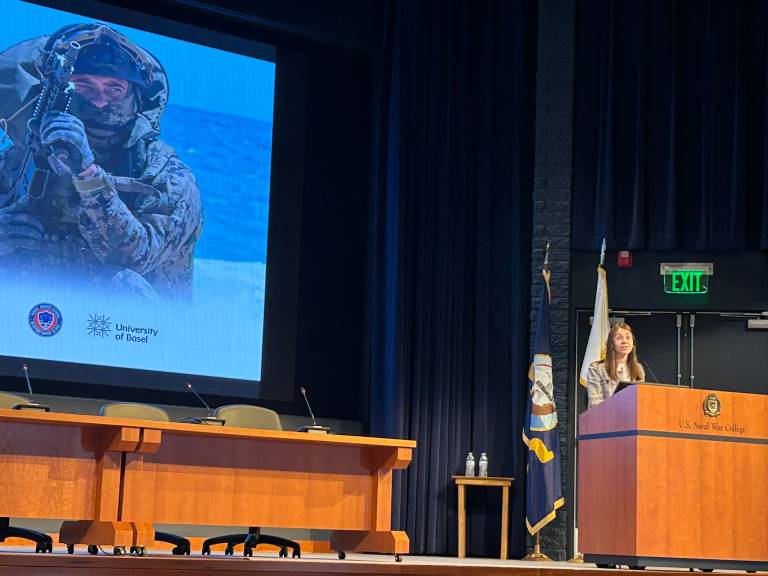Danae Azaria gives keynote speech at Annual “Cushing International Law Conference"
29 May 2023
Dr Danae Azaria gave a keynote speech (25 May 2023) at the 5th annual “Alexander Cushing International Law Conference” organized by the U.S. Naval War College and the Stockton Centre for International Law (Newport, Rhode Island, USA)
Dr Danae Azaria gave a keynote speech (25 May 2023) at the 5th annual “Alexander Cushing International Law Conference” organized by the U.S. Naval War College and the Stockton Centre for International Law (Newport, Rhode Island, USA). The theme of the 2023 conference was “International Law and Conflict at Sea”.
Dr Azaria’s keynote concerned “Sabotage of Undersea Pipelines, Self-Defence and Countermeasures”. The subject of the keynote is based on her long-term research (indicative publications below), as well as on her work as the Co-Rapporteur of the International Law Association (ILA) Committee on Submarine Cables and Pipelines.
In her keynote, Dr Azaria relied on the NordStream pipeline sabotage (2022), as an instance of ‘hybrid warfare’, to contextualize her analysis of the public international law questions arising from attacks on cables and pipelines, as critical infrastructure, at sea. She argued that the right to self-defence is not triggered by an armed attack against a transit pipeline located in the exclusive economic zone of a State. Although sabotage against offshore pipelines and cables is not prohibited by international law, a sabotage violates numerous other law of the sea obligations, such as the obligation for peaceful uses of the sea and the preservation of the marine environment. Non-forcible countermeasures are available to injured States and States other than the injured State. Given that countermeasures would not be available in the NordStream incident, owing to the lack of clarity about which is the responsible State, Dr Azaria argued that States could exercise domestic criminal jurisdiction against the perpetrators.
Overall, Dr Azaria advocated against the temptation to respond forcibly to instances that do not meet the threshold of an armed attack against a particular State, thus deviating from international law and against the temptation to change general international law on the prohibition of use of force in light of the hybrid warfare challenges posed by the NordStream incident. She proposed that the better way forward is to exercise domestic criminal jurisdiction, and to develop responses that perceive sabotage against undersea cables and pipelines as a form of transnational crime.

See relevant publications for further infomation:
- Treaties on Transit of Energy via Pipelines and Countermeasures (OUP 2015)
- Trade Countermeasures for Breaches of International Law Outside the WTO (ICLQ 2022, open access)
- “Is the sabotage of submarine pipelines an ‘armed attack’ triggering a right to self-defence?”, EJILTalk Blog (2022) (with Geir Ulfstein)
 Close
Close

